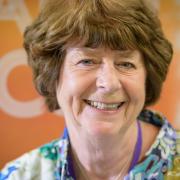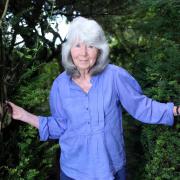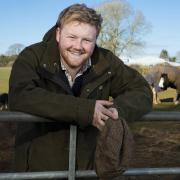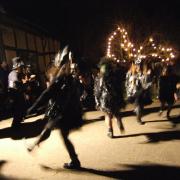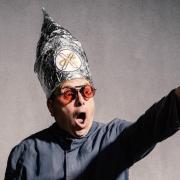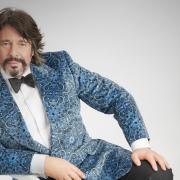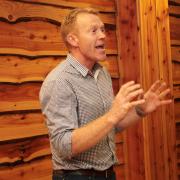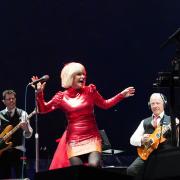As Lord Lieutenant of Gloucestershire, Dame Janet Trotter is a marvellous ambassador for our county. But it’s not always been an easy ride, as Katie Jarvis discovers.

I’ve heard so much about Dame Janet Trotter over the years – University of Gloucestershire vice chancellor; government advisor (even has her own Trotter Report on IT in teacher-training); big cheese in the NHS.
But I’d never, ever interviewed her. “Never, ever?” people would say to me, astonished. “Why on earth not?”
And I’d join them in looking puzzled. Good question. Why on earth not? It just sort of… never happened.
And then I met her. And this is the real point of this introduction - because it says so much about her. I met her at a local society luncheon, where she gave a speech about being Lord Lieutenant of Gloucestershire. How she was so astonished by the letter from David Cameron that she thought it was a joke. How her sister in Canada got all excited and told her, “Of course you must do it!” During that speech, what came through most was her support for Gloucestershire businesses (she’s visited so many and sings their praises loudly); as well as her appreciation of the county’s charities. (Give her a choice between a high-society dinner or a day in Chris Evans’s Butterfly Garden for the disabled, and she’ll tell you to wake up and smell the roses.) And it was during that speech that I really fell for her; she was so normal and unstuffy. Which reminds me of another thing she told us, viz: “My mother always used to say to me, ‘The thing I like about you Janet is that you’re ordinary’.”

Anyway. I meet her fleetingly at this lunch, for the first time. And then I bump into her twice, in quick succession; each time, she greets me warmly and knows exactly who I am. (Yet how many people does she meet?) And then, when I finally truck up at her pretty Cheltenham home, she greets me with the most natural of hugs.
Yep. I’m sold.
“So how do you do that?” I venture to ask Janet Trotter. Because it is a skill, or a gift, or something of that ilk. To be able to wield a powerful sword with the touch of a feather.
She laughs. “People have pre-set ideas about what the vice chancellor of a university might be like. What a Dame; what the chair of a health authority; and what the Lord Lieutenant might be like. So I think I’ve got a number of disadvantages when it comes to people feeling there might be a barrier or that I might be distant.
“But I always think that, if you have power, then it’s up you to make sure you put other people at ease.”
And then she says something totally unexpected. Something that shapes the interview. Because my worry, pre-chatting to her, is that I might end up with reams about education policy; or health authority agendas. Or just a replay of an (albeit fascinating) career.
But what she says, almost as a throwaway line, is: “Most people would think I was fairly articulate, although I started life with a stammer.”
And I realise that, if we are going to stand a chance of getting to know Dame Janet Trotter – the ordinary person – it’s a question of skirting the titles and achievements and going right back to the beginning.
The word ‘ordinary’ is an interesting one, and I’ll use it again when I describe the ordinary family into which she was born in 1943. Both her parents left school at 14 – this was no silver-spoon existence. Yet Janet Trotter would use a different word: ‘privileged’. “My parents were terrific,” she says. “And when I think about the YMCA [an organisation she greatly supports], which helps many people from absolutely chaotic homes, I realise that the greatest privilege in life is to have both your parents there for you; and a mum there, when you want a mum to be there.”
Yet it wasn’t quite that simple. The world she was born into was blighted by war. Her father, a policeman in civilian times, spent three years away from the family home in Kent, in the tank regiment, leading a group of vehicles on minefield duties throughout Europe. As a small child, what Janet mainly understood was his absence. “It wasn’t until recently, when I went into an old tank on Salisbury Plain, that I realised just how appalling that must have been: they’re like tin cans; absolute hellholes. Quite a few people around him were blown up.”
Apart from leaving her with an absolute aversion to war, that separation had other effects. “My father didn’t come back until I was three and I rejected him at that point, much to my mother’s and his grief,” she says, simply.
“The bridge did build itself, particularly towards the end when he had dementia and I was caring for him in every bodily function. He kept saying, ‘You shouldn’t be doing this for me, Janet’. But it was a privilege.”
The impact of that absence on Janet – already a shy little girl – manifested itself in a deep fear of separation. Nursery school, as a result, was an ordeal. “My mother used to describe all these little beds, where we used to have sleeping-time. I don’t remember any of it, just the separation. So I’m not very good at separation still. Or bereavement. All of that is very difficult stuff.”
I ask whether Janet’s deep-seated religious convictions - she’s a lay member of chapter of Gloucester Cathedral (which functions like a board of governors), and a keen advocate of church involvement in higher education – date back to childhood. The question elicits another interesting response. While her father had a religious upbringing, her mother – whom she clearly adored – was more ambiguous in her attitudes. “Before she married, she was in service. She used to tell me about having to get up and do the grates; about having to then change to walk to church while the people from the Big House, as she called it, drove there, often splashing their servants on the way. She also recalled having to say prayers with the family every day: she’d have to stop whatever she was doing, change into clean things, and then back into work clothes, no matter how many people were coming to lunch. So my mother saw the hypocrisy of many of the practitioners of religion.”
In fact, Janet’s mother was a remarkable woman, whose cooking skills won her an Evening Standard competition for a Cordon Bleu course with the great Escoffier. By the time she became chief cook for conductor Sir Adrian Boult, she had a household staff of her own to manage. “But when she married, it all went.”
That must have been frustrating for her?
“She said she got her second education by reading my essays. She was interested in everything I did. So was my father.” Both have now died, but both were there to see their daughter receive her Damehood at Buckingham Palace.
It was her mother who patiently sat Janet before the fire each evening, trying to curb the little girl’s stammer. That dedication paid off, “But even to this day, I believe myself to be inarticulate and not making sense when I speak. When I was head girl at school, I had to get up and say something at mayor-making, and the headmistress kept saying to me, ‘Janet, you’re not trying!’ Of course, I was trying and trying and trying. And the more she said this, the more neurotic and gibbering I became.
“You wrap up all these experiences into the person you are. So I haven’t forgotten where I came from.”
Janet failed the 11+ but came into her own at the age of 14, when school suddenly clicked. Her confidence also started to grow. Having decided she wanted to become a teacher, she spent a gap year as a nursing orderly in a hospital, “where, for the first time, I met people who couldn’t read and write; who just handed their kids over to the system with a cross on a piece of paper”. The experience fired her passion for education even more strongly.
Despite a wobble – “I remember saying to my father, as he drove with me to school to start my teaching, ‘I think I’ve chosen the wrong career!’ He turfed me out at the school gate and said, ‘Get on with it!’” – she was an outstanding success from the start.
“I found, somehow, that I could communicate with young people. They usually gave me the toughest class in the school; in fact, they used to send for me when a class went on the rampage, to calm them down, even when I was still in my second year of teaching.”
So how did she control these difficult children?
“It wasn’t about control. It was about being committed to helping them develop their potential, whatever that was.”
OK, then. So what did they sense in her that they couldn’t find in others?
“Someone who cared for them. I used to go round my first school, smiling. And some of the kids used to say to me, ‘Why are you smiling, miss?’ And I would reply, ‘Because I so enjoy being here.’
“This under-confident 21-year-old, who was very shy; not revealing very much to the world; suddenly realised that, when she was in the classroom, she became more fully human, if that makes sense. I could share more; I could open up more; and I felt I was doing something more worthwhile.”
Text, of course, often fails to offer up the manner in which things are told. So let me elaborate: with humour; compassion; straightforwardness. Never self-pity; never self-indulgence. And never, ever any sense of condemnation of others.
Does Janet look at her childhood – lacking material things but rich in security – and question the values the world of today has adopted? In other words, parents absent in the name of huge salaries; parents who push their kids through tests from the age of three upwards; no-penalty divorces?
“I think it’s very difficult today to have a successful marriage; there are so many pressures on the family; on work environments; the context is so uncertain. And I think it’s more difficult for families to keep together, for whatever reason.
“A lot of the young people in Gloucestershire that we’re trying to help are those who seem to be in families where they’re adjunct to a lot of other stuff that’s going on. So a single parent has problems; an unemployed parent has problems; all of that puts untold pressure on people. But I don’t want to judge. I just think that, for some children growing up in those households, life can be difficult.”
We talk about the place of religion in education: it is, she says, a wonderful way of instilling values, but one where extremism of any kind has no place. “Look at Africa, at the moment, where some of the Christian practices include homophobia and no rights for women. Or the Bible Belt in America.”
She’s forthright about other beliefs – a higher education for all (she’s anti tuition fees and purposefully retired the year they were introduced); equally, she is a standard-bearer for healthcare at the point of need, irrespective of ability to pay. “I know that can be abused, but there you go.”
She knows full well that decisions she’s made, over the years, have been deeply applauded, while others have been controversial. And, even as Lord Lieutenant, that’s not likely to change. “Oh golly! Dear, dear, dear!” she laughs. “I’m not supposed to be controversial and, actually, I’ve never gone out of my way to be controversial. Some of the things I’ve done have pitched me into controversy but I regret that. It was never for me; it was for what I thought was important in the world. Coping with criticism is not easy as a public figure: I have found it difficult.”
But Dame Janet Trotter firmly believes that she’s not been appointed the Queen’s representative to lord it over others; rather, to provide equality and opportunity for all, no matter their background, no matter their status, no matter their bank balance.
“Gloucestershire is seen as divided as a community,” she says, “but I’ve got a view that I’m here for everybody: the more people are on the margins, the more I should try and include them in Gloucestershire society. Now, not all of them will want to be included; but a lot are there purely through circumstance. If you can give them a helping hand or give them a bit of hope; or if you can thank some of the 66,000 people who are volunteers and caring for relatives and so on, then you’re doing a great job.
“One of the lines in my job description is to uphold the dignity of the Crown. Does that mean that you can’t roll your sleeves up and muck in? I don’t think so.
“Life is about asking: what sort of individual do I want to be? What sort of society do I want to live in? And, most importantly of all, am I prepared to get up and help create that sort of society?”
The answer, in Dame Janet’s case, hardly needs articulating.
---------------------------------
This article by Katie Jarvis is from the August 2014 issue of Cotswold Life.
Pictures by: Carl hewitt.
For more from Katie, follow her on Twitter: @katiejarvis




